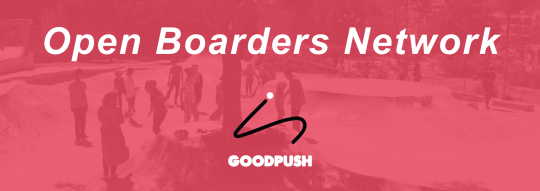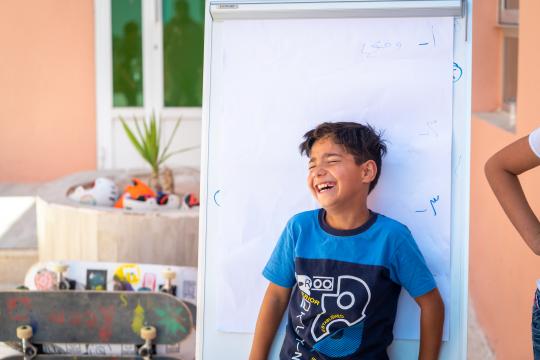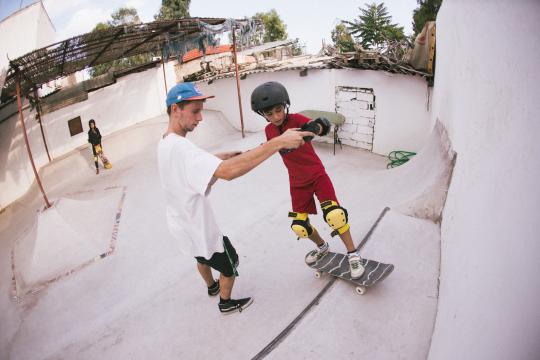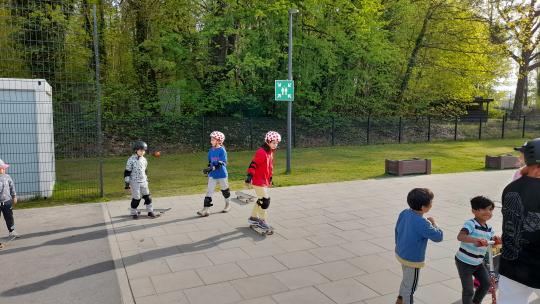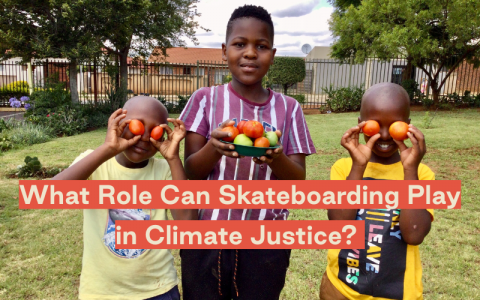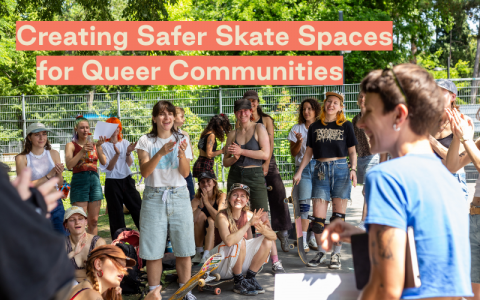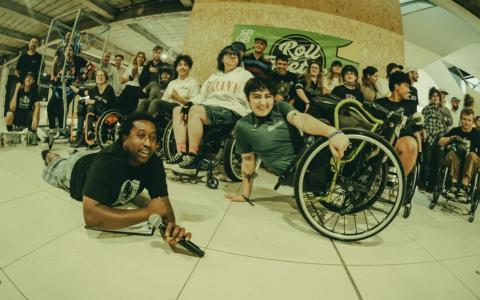In 2021, 30% of social skateboarding projects who completed our annual survey stated that they work with displaced youth and this figure is set to significantly rise in the years to come. While there are various resources and guides related to inclusion and empowerment through sport, there is a distinct lack of guidance related specifically to skateboarding-based programs serving displaced youth.
This is why the Goodpush Alliance have recently formed the Open Boarders Network to support the growth of quality programming for the inclusion of refugee children and displaced communities in skateboarding programs worldwide. Keep reading to find out more about why this initiative came about and the positive effects of skateboarding-based programs on wellbeing for displaced youth.
The global movement of social skateboarding initiatives
In the last five years, social skateboarding initiatives have popped up in all corners of the globe. From Ghana to Papua New Guinea, Bolivia to Belgium, skateboarding programs are working towards social inclusion, gender empowerment and physical and mental wellbeing. What is it about skateboarding which makes it so beneficial for mental health, and how can we work to support the inclusion of displaced communities in this movement?
The psychosocial benefits of skateboarding
Aside from the physical benefits of regular participation, skateboarding workshops provide the opportunity to learn a gratifying skill in a supportive environment; teaching the value of cooperation, respect for others, and the importance of persistence after failure.
You learn individually and at your own pace, but in doing that you become part of a collective with a shared identity as skaters — and belongingness is especially important for teenagers and vulnerable youth. For youth who are displaced these connections are even more important.
Crucially, there is no wrong way of skateboarding — it is non-competitive and allows for ownership and creative expression. It invites you to play and explore, all within your own boundaries of comfortability, and this is conducive to a very positive learning environment.
Fostering resilience through failure
The process of learning a new skill on a skateboard allows young people to experience a succession of small failures before the success. These small doses of failure help young people to manage their emotions little-by-little and thus learn over time to better regulate their emotions.
Every skater knows the process: you try, you fall, you get up again. You try, you fall, you get up again. This acceptance of failure – when experienced in a gradual way – is an integral part of fostering determination and resilience. Children who have lived through displacement no doubt already have a lot of resilience, but the experience through skateboarding is a positive way for them to challenge themselves and push their own limits in a safe, supportive environment.
How skateboarding helps to regulate emotions
Recent research from Hull Services and the ChildTrauma Academy demonstrates how the various elements of skateboarding can be effective in fostering emotional regulation. In their Push to Heal video, Joel Pippus (Youth Care Counsellor, Hull Services) and Dr. Emily Wang (Director of Trauma Informed Services, Hull Services) share how skateboarding fits within the neurosequential model of therapeutic care by the ChildTrauma Academy, which is designed for working with children affected by trauma.
Hull Services have found that skateboarding, due to its social aspects and high sensory stimuli, can help to create regulation in the lower domains of the brain (the brainstem and the diencephalon), which in turn effects positive changes within the higher regions of the brain (the limbic system and the neocortex). This enables development that can be beneficial for young people suffering from dysregulation and developmental delay due to trauma and prolonged stress in childhood. These findings bring hope for young people affected by displacement, war, and other traumatic experiences.
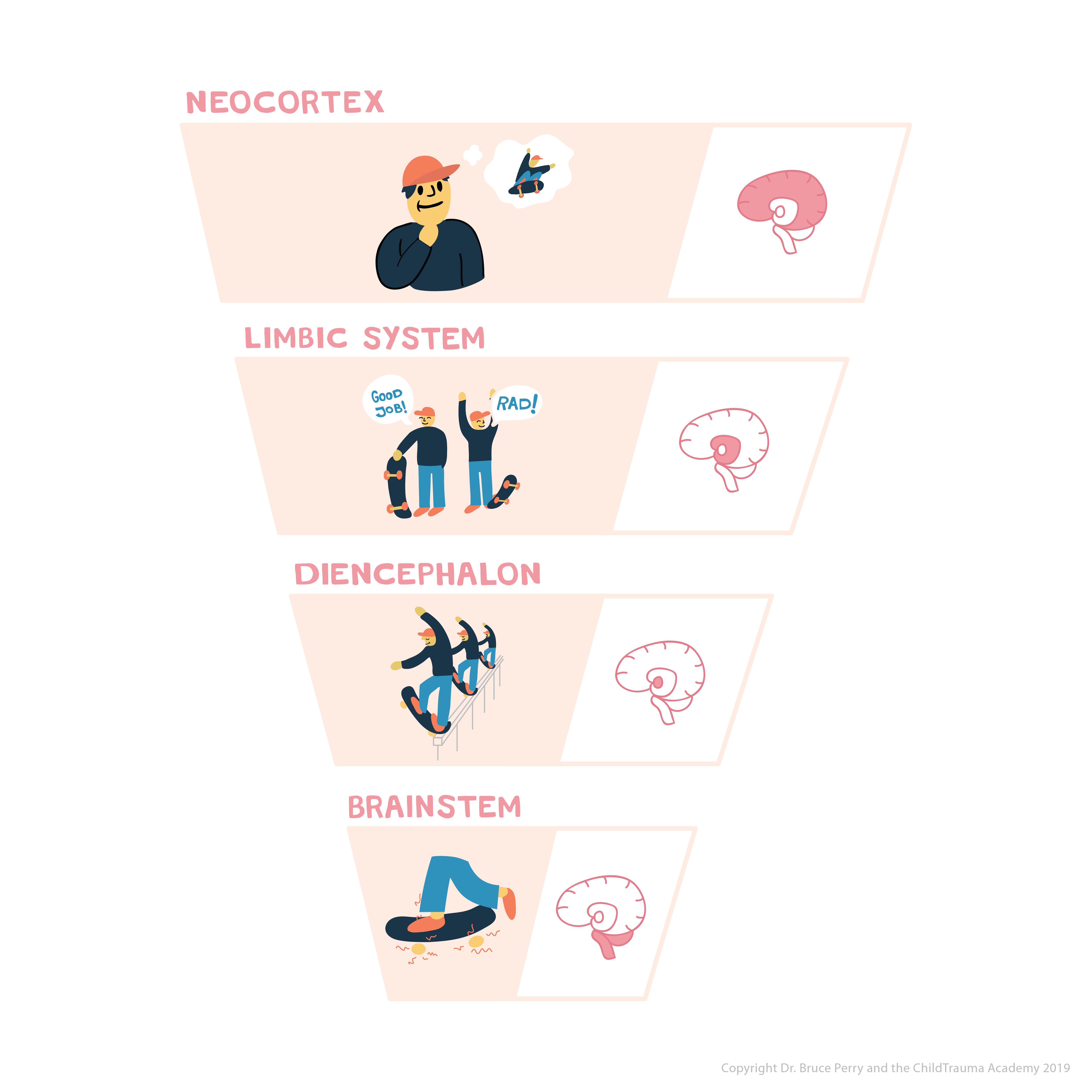
Skateboarding itself incorporates many different sensory stimuli—vibrations, sounds, motion, speed, the wind against your face—and demands multiple skills such as balance, strength, coordination and agility. Couple these with the social aspects of skating within a skatepark or workshop, and you also have to think about etiquette, social cues, body language and communication.
These various factors mean that the diencephalon, limbic system and the neocortex are all receiving positive and soothing stimuli. By allowing the brain to function in this way, skateboarding is creating the perfect environment for self-regulation; enabling one to learn new skills and manage complex emotions.
Trauma-informed practices and improved mental health
It is likely that most displaced youth around the world are not only impacted by the experience of trauma, but also by precarious living situations and exclusion within host communities. Trauma can severely damage the communication routes within the brain—making it extremely difficult for an individual to voice their inner-experiences, which can often lead to further isolation and frustration.
Free Movement Skateboarding, a social skateboarding project based in Athens, Greece, which predominantly works with displaced communities, share how they implement trauma-informed practices into their workshops:
This group communication is also a key factor in establishing connections between people and creating a sense of belongingness, which is so crucial for maintaining healthy relationships. With these social factors working in unison with the neural connections mentioned above, we can see how skateboarding regularly in a supportive environment can begin to re-establish communication, self-worth and self-regulation; helping to manage stress and improve mental health.
About the Open Boarders Network and next steps
The Open Boarders Network was founded in late 2022 with five of the leading organizations delivering skateboarding programs for displaced youth – 7Hills (Jordan), Drop In (Germany), Free Movement Skateboarding (Greece), Skateistan (global), and Skate Nation (Sweden). The Open Boarders Network is creating a space to formally document knowledge and expertise in order to share learnings and support emerging initiatives looking to reach displaced youth for the first time.
Through direct support and the creation of open-source resources, the Open Boarders Network hopes to increase the social inclusion of displaced people in their new communities and improve mental health and wellbeing for displaced communities worldwide.
If you’d like to learn more or get involved, email us at: goodpush@skateistan.org.
